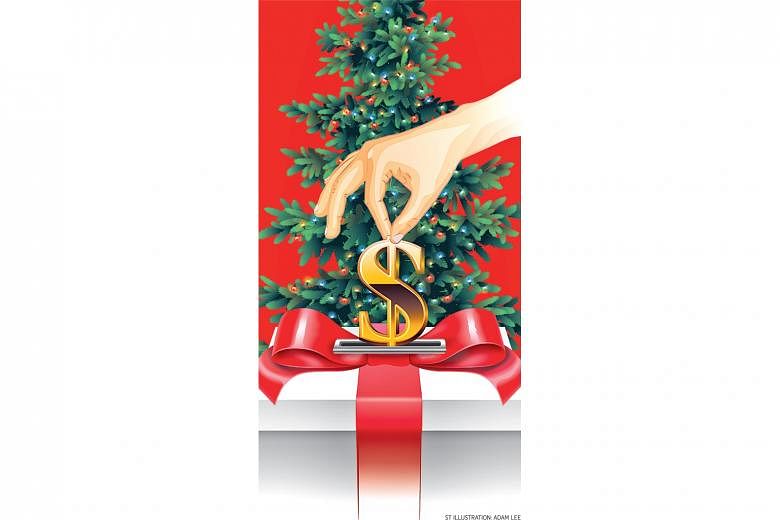Christmas has always been a period of giving and kindness for me; my heart swells with hopes of even better tidings to come as I await the start of another new year.
But four years ago, right after Christmas, I got an anguished e-mail from a reader who felt friendless and depressed after losing a big pile of money in the stock market.
The pain he experienced as his erstwhile friends turned their backs on him was the very antithesis of the season of goodwill and generosity that has come to epitomise Christmas for me.
He wrote: "When you can no longer provide financial assistance to people or buy them restaurant treats, you see a different side of them. Some are supportive. Some question you. Some will laugh at your predicament. Some will even avoid you, thinking that you will borrow money from them."
Worse, he was jobless and he had even lost the funds meant for his family's basic needs. "Every day is a challenge mentally and physically to put food on the table. I never thought that I would be in such a state since I have always been prudent financially."
His pain encapsulates for me the capriciousness of human nature - that you will know who your true friends are only when you are down on your luck.
When I asked him in an e-mail the following Christmas if his money troubles had been resolved, he replied philosophically: "I have my fair share of dark days. I think of a reason just to wake up every day, and to move on to another day."
But I was glad he had taken the ordeal in his stride, as he ended his e-mail on a positive note, saying: "Things can only get better from here… I have to remind myself of that every day."
He didn't reply to my subsequent e-mails but whenever Christmas is around the corner, I always wonder how he is faring and hope that he has straightened out his finances.
In my long career as a financial reporter, I have encountered other people with similarly sad stories - those who had been wildly successful in their lives and felt betrayed by friends who failed to lend them a hand when they suffered a setback.
It underlines for me the need to be self-reliant financially. Rather than having to count on the charity of friends to bail you out when you are drowning, you must make sure you have your own life-buoy to stay afloat when you are thrown into the deep end financially.
To me, that means keeping some cash handy in case of that potential disaster that you hope will never hit you - whether it is losing your job, coping with a bout of prolonged illness or your loved ones suddenly needing financial assistance.
However, there are people who do not believe in taking precautionary measures such as having an emergency fund: They argue that they have adequate health insurance to protect them against medical disasters and that they have ample credit from banks that they can draw on if they need money urgently.
They feel it is better to make their spare cash work harder by investing in shares or property to get a better return, given that the bank pays them next to nothing on their deposits.
But, as investment guru Warren Buffett has said, holding cash - and lots of it - enables him to sleep soundly at night. It also ensures that he does not have to rely on the kindness of strangers who may cut off his bank credit lines when they are needed most - a reflection that cash is king at all times.
When I started working in 1986, one of my first acts when I got my first pay packet was to open a "Save-as-you-earn" (SAYE) account with POSB, now part of DBS Bank. It deducted 10 per cent of my salary every month to be placed in the SAYE account, which offered a slightly higher interest than the regular savings account.
Versions of such accounts on the market now include DBS' MySavings Account and OCBC's Monthly Savings Account.
Some financial institutions - DBS, OCBC, Phillip Securities and Maybank Kim Eng - even combine a saver's desire to save as well as invest by offering a variation that allows him to buy shares of a fund tracking the Straits Times Index for as little as $100 a month.
But the snag in this case is the price you may have to pay if you need money in a hurry and have to liquidate the STI fund. It's possible that you could suffer a capital loss if market conditions are bad.
When DBS started an account that allowed customers to consolidate their banking transactions, I took that up. So long as I credit my salary, credit card spending, investment dividends and mortgage instalments with DBS, I get to enjoy a higher interest rate on up to $50,000 in this Multiplier account.
Similar schemes include OCBC 360 and United Overseas Bank's UOB One Account.
One question I am often asked is how much we should put away for emergency purposes. The rule of thumb is to have at least six months' worth of expenses. Those expenses should include what you pay on your mortgage, utilities, car loan, insurance, groceries and other essential items.
But I took one further measure to bolster my cash reserve - I joined the Straits Times Co-operative, a company scheme in which members can park up to 25 per cent of their monthly salary in a savings plan, subject to a cap of $300.
The money I keep there is my last line of defence against any sudden pressing financial need I may encounter. Without having to liquidate any investments, I can take out a loan using the savings as collateral.
But not all co-operatives are open to the public. For example, the ST Co-operative is open only to staff of Singapore Press Holdings and Times Publishing.
But the Telecoms Credit Co-operative - which used to cater to staff of Singtel and Singapore Post - is open to the public. Its website shows that it has a subscription savings account offering an interest rate ranging from 3 to 5 per cent. Members can also take up loans against their savings with the co-operative.
For me, the initial quest to squirrel away money to build an emergency fund helped to lay the framework for feathering a retirement nest egg that dovetails nicely with my CPF savings.
It also gives me the funds to pick up investments on the cheap amid a financial calamity, while other investors may be caught in a cash bind and even be forced to sell at fire-sale prices because they are overstretched.
As such, make this your New Year resolution: Keep an emergency cash kitty - and do not touch it unless you are in dire financial straits. It will help to keep that proverbial wolf well away from your door.



